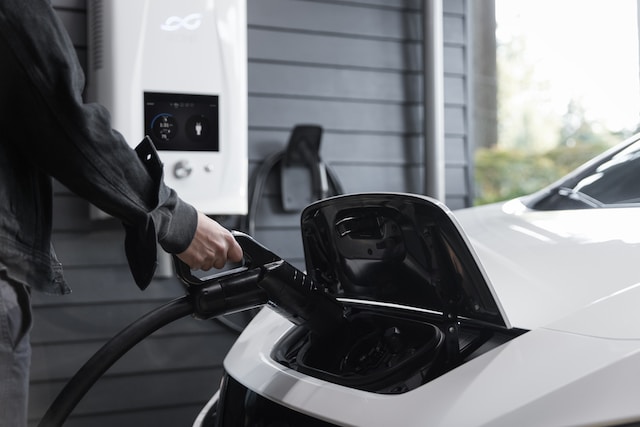
A Portable EV Charger is an electric vehicle (EV) charging device that can be transported and used in various locations, such as at home, work, or on the go. It typically includes an AC adapter and a charging cable that can be plugged into a standard electrical outlet, and is designed to provide a convenient and flexible way to charge an EV without requiring permanent installation. Portable EV chargers can vary in charging speed, compatibility with different EV models, and safety features, among other factors.
Importance of Portable EV Charger
Portable EV chargers are important for several reasons:
Flexibility: Portable EV chargers allow EV owners to charge their vehicles anywhere they go, whether it’s at home, work, or on a road trip. This flexibility makes it easier for EV owners to plan their trips and avoid range anxiety.
Convenience: With a portable EV charger, EV owners can charge their vehicles on their own time, without having to wait in line at public charging stations or coordinate with others who may be using the charging station.
Cost-Effectiveness: Portable EV chargers can be a more cost-effective option than installing a permanent charging station. They are also a good option for renters who may not be able to install a charging station at their place of residence.
Emergency Backup: In case of power outages, a portable EV charger can serve as an emergency backup to keep an EV charged and operational.
Overall, portable EV chargers provide EV owners with a more flexible, convenient, and cost-effective way to charge their vehicles, making EV ownership more accessible and practical for a wider range of people.

Features of Portable EV Charger
The features of a Portable EV Charger can vary depending on the brand and model, but some common features include:
Compact size and lightweight: Portable EV chargers are designed to be easily transported and stored, with a compact size and lightweight design that makes them easy to carry in a car trunk or backpack.
Compatibility with various EV models: Portable EV chargers can be used with a wide range of EV models, as long as the charging connector is compatible with the vehicle.
Fast charging capability: Some portable EV chargers can deliver high charging speeds, allowing EV owners to charge their vehicles quickly and efficiently.
Safety features: Portable EV chargers often include safety features such as overcurrent protection, overvoltage protection, and overtemperature protection to prevent damage to the vehicle and ensure safe charging.
User-friendly design: Portable EV chargers typically have a simple and intuitive design that makes them easy to use, with clear LED indicators to show the charging status and other important information.
The features of a Portable EV Charger are designed to provide a convenient, efficient, and safe way to charge an EV on the go, making it easier for EV owners to enjoy the benefits of electric mobility.
Compact size and lightweight
Compact size and lightweight are important features of a Portable EV Charger as they make it easy to transport and store the charger. A Portable EV Charger is typically designed to be small and lightweight, making it easy to carry in a car trunk or backpack. This feature is particularly important for people who travel frequently with their EVs, as it allows them to charge their vehicle wherever they go without having to carry heavy or bulky equipment.
The compact size of a Portable EV Charger also makes it easy to store at home or work, without taking up too much space. This is particularly important for people who live in apartments or other small spaces, where there may not be enough room for a permanent charging station.
The compact size and lightweight design of a Portable EV Charger make it a convenient and practical option for EV owners who need to charge their vehicles on the go or in a limited space.
Compatibility with various EV models
Compatibility with various EV models is an important feature of a Portable EV Charger. EVs come with different types of charging connectors, and a Portable EV Charger needs to be compatible with the connector type of the specific EV it is intended to charge.
Most Portable EV Chargers come with adapters or cables that can be used with different types of charging connectors, such as Type 1 or Type 2 connectors. Some Portable EV Chargers also have adjustable current and voltage settings that can be customized to match the requirements of different EV models.
Compatibility with various EV models is important because it allows EV owners to use the same charger for different EVs, or even for multiple EVs they may own. This is particularly useful for households with more than one EV, as it allows them to share a single charger.
Overall, compatibility with various EV models is a crucial feature of a Portable EV Charger, as it ensures that the charger can be used with a wide range of EVs, making it a more versatile and practical charging solution.
Fast charging capability
Fast charging capability is an important feature of a Portable EV Charger as it allows EV owners to charge their vehicles quickly and efficiently. The charging speed of a Portable EV Charger can vary depending on the brand and model, but some chargers can deliver high charging speeds, allowing EV owners to charge their vehicles in a fraction of the time it takes with a standard Level 1 charger.
Some Portable EV Chargers have a maximum charging power of 240V and 32A, which can deliver charging speeds of up to 7.2 kW. This means that a typical EV with a 60 kWh battery can be charged from 0 to 80% in just a few hours.
Fast charging capability is particularly important for people who travel long distances with their EVs, as it allows them to quickly top up their vehicle’s battery at public charging stations or at home before hitting the road. It is also useful for people who have a limited amount of time to charge their vehicles, such as those who need to charge their EV at work during a short break.
Overall, fast charging capability is an important feature of a Portable EV Charger, as it allows EV owners to charge their vehicles quickly and efficiently, making electric mobility more practical and convenient.
Safety features
Safety features are an important aspect of a Portable EV Charger, as they ensure safe and reliable charging of the EV. Some common safety features of a Portable EV Charger include:
Over current protection: This feature prevents the charger from delivering too much current to the EV, which can damage the vehicle’s battery or other electrical components.
Overvoltage protection: This feature prevents the charger from delivering too much voltage to the EV, which can also damage the vehicle’s battery or other electrical components.
Over temperature protection: This feature prevents the charger from overheating, which can cause damage to the charger or the EV.
Short-circuit protection: This feature protects the charger and the EV from short circuits, which can cause damage or even a fire.
Ground fault protection: This feature protects against electric shock by detecting any electrical current leakage and interrupting the charging process.
Surge protection: This feature protects against power surges, which can damage the charger or the EV.
Overall, safety features are essential to ensure safe and reliable charging of an EV, and Portable EV Chargers that include these features offer added peace of mind for EV owners.
Types of Portable EV Chargers
There are several types of Portable EV Chargers available on the market, each with its own unique features and capabilities. Here are some of the most common types:
Level 1 Charger
Level 1 Chargers are the most basic type of EV charger and are designed to plug into a standard 120V household outlet. They typically deliver a charging rate of around 4-5 miles of range per hour, depending on the EV’s battery capacity and other factors.
Level 1 Chargers are commonly included with new EV purchases and are typically compact, lightweight, and easy to use. They are best suited for overnight charging at home or in other locations where charging time is not a major concern.
One advantage of Level 1 Chargers is that they do not require any special electrical installation or equipment, as they can be plugged into a standard household outlet. However, this also means that they are limited in their charging capabilities and may not be suitable for EV owners with longer daily commutes or those who frequently travel long distances.
Overall, Level 1 Chargers are a convenient and affordable option for many EV owners, particularly those who have limited charging needs or who are just starting to explore the world of electric mobility. However, for faster charging speeds and more versatility, Level 2 or DC Fast Chargers may be a better option.
Level 2 Charger
Level 2 Chargers are a step up from Level 1 Chargers, delivering faster charging speeds and greater versatility. They are designed to plug into a 240V outlet, which can deliver up to 10 times more power than a standard 120V household outlet used by Level 1 Chargers.
With a Level 2 Charger, EV owners can expect a charging rate of up to 25 miles of range per hour, depending on the charger’s specifications and the EV’s battery capacity. This means that a typical EV with a range of around 200 miles can be fully charged in 8 hours or less, making Level 2 Chargers suitable for home, workplace, or public charging.
Level 2 Chargers are typically larger and heavier than Level 1 Chargers, and may require professional installation to ensure proper electrical wiring and safety. However, they offer greater flexibility and convenience, with features such as adjustable charging rates, Wi-Fi connectivity, and compatibility with multiple EV models.
Overall, Level 2 Chargers are a popular choice for EV owners who require faster and more convenient charging options, particularly those with longer daily commutes or who frequently travel long distances. They may require a higher upfront cost than Level 1 Chargers, but can offer significant long-term savings in fuel costs and reduced carbon emissions.
DC Fast Charger
DC Fast Chargers, also known as Level 3 Chargers, are the fastest charging option available for electric vehicles (EVs). They are designed for rapid charging at public charging stations and can deliver a high charging rate of up to 50-350 kW, depending on the charger’s specifications and the EV’s battery capacity.
With a DC Fast Charger, an EV owner can typically charge their vehicle up to 80% of its battery capacity in as little as 20-30 minutes, making it a convenient option for long-distance travel and busy schedules. However, it’s important to note that charging rates can vary depending on the specific charger and EV being used.
DC Fast Chargers are larger and more expensive than Level 1 and Level 2 Chargers, and require specialized installation and infrastructure to operate. They are typically not suitable for home charging and are instead located at public charging stations along highways, in parking lots, and other public areas.
Despite their high cost and specialized use, DC Fast Chargers play an important role in promoting the adoption of electric vehicles, particularly for long-distance travel and reducing range anxiety. Many governments and private organizations are investing in the deployment of more DC Fast Chargers to support the growth of the EV market and reduce dependence on fossil fuels.
How do Portable EV Chargers work?
Portable EV Chargers work by converting the AC (alternating current) power from a power source, such as a standard household outlet or a Level 2 charging station, into DC (direct current) power that can be stored in an electric vehicle’s battery.
The charging process begins by plugging the Portable EV Charger into a power source, which provides the AC power needed to charge the EV. The charger then converts the AC power into DC power and regulates the voltage and current to ensure safe and efficient charging.
The Portable EV Charger communicates with the EV to determine the charging status, battery capacity, and charging rate. It then adjusts the charging rate and voltage to deliver the optimal charging speed and prevent overcharging or undercharging of the battery.
Once the battery is fully charged or the charging session is complete, the Portable EV Charger automatically stops the charging process and disconnects from the power source. Some Portable EV Chargers also include safety features such as overheating and overcurrent protection to ensure safe and reliable charging.
Overall, Portable EV Chargers are a convenient and flexible way to charge an electric vehicle, offering portability and compatibility with a wide range of EV models and charging stations.
Electrical components
The electrical components of a Portable EV Charger can vary depending on the specific charger model and manufacturer, but generally include the following key components:
AC to DC converter: This component converts the AC power from a power source into DC power that can be stored in an electric vehicle’s battery.
Voltage and current regulators: These components regulate the voltage and current to ensure safe and efficient charging, and to prevent overcharging or undercharging of the battery.
Control circuitry: This component communicates with the EV to determine the charging status, battery capacity, and charging rate, and adjusts the charging rate and voltage accordingly.
Display screen: Many Portable EV Chargers include a display screen that shows the charging status, battery level, and other important information.
Safety features: These components, such as overheating and overcurrent protection, are designed to ensure safe and reliable charging.
Cables and connectors: These components connect the Portable EV Charger to the power source and the EV, and can vary in length and type depending on the charger model and EV specifications.
Overall, the electrical components of a Portable EV Charger are designed to deliver safe, efficient, and reliable charging to electric vehicles, and to provide EV owners with a convenient and flexible charging solution.
Charging process
The charging process for a Portable EV Charger can vary depending on the charger model and the EV being charged, but generally follows these steps:
Plug the charger into the power source: This can be a standard household outlet, a Level 2 charging station, or another compatible power source.
Connect the charger to the EV: This is done using the cables and connectors provided with the Portable EV Charger. The EV should be parked in a safe and level location and turned off before connecting the charger.
Turn on the charger: This is done using the controls or buttons on the charger itself. Some chargers may also require an app or other device to initiate the charging process.
Monitor the charging process: Many Portable EV Chargers include a display screen that shows the charging status, battery level, and other important information. The charging process can take anywhere from a few hours to several hours depending on the charger model, EV specifications, and battery level.
Disconnect the charger: Once the charging process is complete, the charger should be turned off and disconnected from the EV and the power source. The cables and connectors should be safely stowed and the charger should be stored in a dry and secure location.
It’s important to follow the manufacturer’s instructions and safety guidelines when using a Portable EV Charger to ensure safe and efficient charging.
Charging time
The charging time for a Portable EV Charger can vary depending on several factors, including the charger model, EV specifications, and battery level. In general, the charging time for a Portable EV Charger can range from a few hours to several hours.
Level 1 chargers, which operate on standard household outlets, typically have a charging rate of around 4-5 miles of range per hour of charging. This means that it can take up to 8-12 hours to fully charge an EV with a Level 1 charger, depending on the size of the battery.
Level 2 chargers, which operate on 240-volt power sources such as a dedicated EV charging station or a home charging unit, typically have a charging rate of around 10-30 miles of range per hour of charging. This means that it can take around 3-8 hours to fully charge an EV with a Level 2 charger, depending on the size of the battery.
DC Fast Chargers, also known as Level 3 chargers, can charge an EV battery to 80% capacity in as little as 30 minutes. These chargers are typically found at public charging stations and are designed for quick and convenient charging during long road trips.
It’s important to note that the charging time for a Portable EV Charger can also be affected by factors such as temperature, battery age, and charging speed, and that these factors can vary depending on the specific charger model and EV being charged.
Benefits of Portable EV Charger
There are several benefits of using a Portable EV Charger, including:
Convenience
Convenience is one of the primary benefits of using a Portable EV Charger. With a Portable EV Charger, you have the freedom to charge your EV wherever you have access to a power source, whether that’s at home, at work, or on the road. This can be particularly useful for EV owners who don’t have access to a dedicated charging station or home charging unit, or who need to charge their vehicle during a long road trip.
A Portable EV Charger is also a convenient option for EV owners who may need to charge their vehicle in multiple locations throughout the day, such as during a commute or while running errands. By having a Portable EV Charger with you, you can easily charge your vehicle wherever you go, without having to rely on public charging stations or other charging infrastructure.
Overall, the convenience of a Portable EV Charger can help to make EV ownership more accessible and appealing for a wider range of drivers, and can help to increase the overall adoption and use of EVs as a sustainable transportation option.
Cost-effectiveness
Cost-effectiveness is another benefit of using a Portable EV Charger. Depending on your EV charging needs and location, using a Portable EV Charger can be a more cost-effective option compared to other charging options such as public charging stations or installing a dedicated charging unit at home.
Using a Portable EV Charger can help you avoid the cost of paying for public charging stations, which can vary in price depending on the location and charging speed. Additionally, using a Portable EV Charger at home can be a cost-effective alternative to installing a dedicated charging unit, which can require significant upfront costs for installation and equipment.
Furthermore, Portable EV Chargers can be used with standard electrical outlets, which are available in most homes and businesses. This means that you can avoid the cost of installing a dedicated charging unit, which may require upgrades to your electrical system.
Overall, the cost-effectiveness of a Portable EV Charger can help to make EV ownership more affordable and accessible for a wider range of drivers, and can help to increase the overall adoption and use of EVs as a sustainable transportation option.
Emergency backup
Another benefit of a Portable EV Charger is that it can serve as an emergency backup for your EV’s battery. In the event of a power outage or other emergency situation, a Portable EV Charger can help to ensure that you have access to a reliable and convenient charging solution for your vehicle.
This is particularly useful for EV owners who rely on their vehicles for transportation, as a power outage or other emergency situation could otherwise leave them without a means of transportation. By having a Portable EV Charger as an emergency backup, you can help to ensure that you can continue to use your vehicle even in challenging circumstances.
Overall, the emergency backup capabilities of a Portable EV Charger can provide EV owners with added peace of mind, knowing that they have a reliable and convenient backup solution for their vehicle in the event of an emergency.
Factors to consider when choosing a Portable EV Charger
When choosing a Portable EV Charger, there are several factors to consider, including:
Charging speed
Charging speed is an important factor to consider when choosing a Portable EV Charger. The charging speed will determine how quickly you can charge your EV’s battery, which can impact how long you need to wait to continue your journey.
Portable EV Chargers typically come in different charging levels, which correspond to the maximum charging speed that the charger can provide. The three common charging levels are:
Level 1: Provides a charging speed of up to 2.4 kW and typically requires a standard 120-volt household outlet. This is the slowest charging option but can be useful for overnight charging at home.
Level 2: Provides a charging speed of up to 7.2 kW and typically requires a 240-volt outlet. This is a faster charging option and can be useful for daily charging needs, such as at home or at work.
DC Fast Charging: Provides a charging speed of up to 50 kW or more and requires a specialized charging station. This is the fastest charging option and can be useful for long trips or emergency charging needs.
When choosing a Portable EV Charger, consider the charging speed that you need based on your daily driving habits and charging needs. If you frequently travel long distances or have a busy schedule, a faster charging option may be more suitable for your needs. If you primarily use your vehicle for short trips, a slower charging option may be sufficient.
Overall, it’s important to choose a Portable EV Charger that provides a charging speed that meets your specific needs and provides safe and reliable charging for your EV.
Compatibility with your EV model
Another important factor to consider when choosing a Portable EV Charger is compatibility with your EV model. It’s essential to ensure that the charger you choose is compatible with the make and model of your EV, as well as the charging standard used by your vehicle.
Different EVs use different charging standards, such as CHAdeMO, CCS, or Tesla’s proprietary Supercharger standard. Ensure that the Portable EV Charger you choose supports the charging standard used by your vehicle to ensure that it can charge your EV effectively.
It’s also important to check the amperage and voltage requirements of your EV and ensure that the Portable EV Charger you choose meets those requirements. If you have a high-capacity battery, you may need a Portable EV Charger that can provide higher amperage or voltage for faster charging.
Overall, it’s important to choose a Portable EV Charger that is compatible with your EV to ensure safe and reliable charging. Check the specifications of both your EV and the Portable EV Charger before making a purchase to ensure compatibility.
Safety features
Safety features are a crucial factor to consider when choosing a Portable EV Charger. EV charging involves high-voltage electricity, and safety features can help prevent accidents and ensure safe and reliable charging. Here are some safety features to look for in a Portable EV Charger:
Over current protection: This feature protects against excessive current flowing to your EV’s battery, which can cause damage or overheating.
Over voltage protection: This feature protects against excessive voltage, which can damage your EV’s battery or electrical system.
Ground fault protection: This feature protects against electrical shock by detecting any current leakage to the ground and interrupting the charging process.
Overheating protection: This feature monitors the temperature of the charging unit and EV battery to prevent overheating, which can damage the battery or cause a fire.
LED indicators: LED indicators on the Portable EV Charger can provide information about the charging status and any potential issues.
Automatic shut-off: This feature automatically shuts off the charging process once the battery is fully charged to prevent overcharging and damage to the battery.
Waterproof and dustproof design: A Portable EV Charger designed with waterproof and dustproof features can provide added safety in wet or dusty environments.
It’s important to choose a Portable EV Charger with safety features that ensure safe and reliable charging for your EV. Consider the safety features that are important to you based on your specific needs and charging environment.
Durability and warranty
Durability and warranty are also important factors to consider when choosing a Portable EV Charger.
First, you want to ensure that the charger is built with durable materials that can withstand regular use and outdoor conditions. The charger should be able to withstand water, dust, and other environmental factors. Look for chargers with durable, high-quality materials and sturdy construction.
Secondly, you want to consider the warranty offered by the manufacturer. A warranty can provide peace of mind and protect your investment if the charger malfunctions or fails to perform as expected. Look for chargers with a warranty that covers any defects or malfunctions for an extended period, typically one to two years.
Additionally, consider the customer support offered by the manufacturer. Do they offer technical support, troubleshooting assistance, or replacement parts? Good customer support can make a significant difference in the event of a problem.
In summary, consider the durability of the Portable EV Charger and the warranty offered by the manufacturer when making a purchase. Look for chargers made with durable materials, sturdy construction, and a warranty that covers any defects or malfunctions for an extended period. Good customer support can also be an essential factor to consider.
Popular Portable EV Chargers in the market
There are several popular Portable EV Chargers available in the market. Here are some of the most popular ones:
Tesla Mobile Connector
The Tesla Mobile Connector is a Portable EV Charger designed specifically for Tesla vehicles. It is included with every new Tesla vehicle and can also be purchased separately from Tesla.
The Mobile Connector is compact and lightweight, making it easy to store and transport. It can deliver up to 40 amps of power and can be used with a variety of outlets, including NEMA 14-50, NEMA 5-15, and NEMA 5-20. It also comes with adapters for use in different countries.
The Mobile Connector has built-in safety features, including overcurrent and overvoltage protection, and can charge most Tesla vehicles in a few hours, depending on the battery capacity and charging rate of the vehicle.
One of the unique features of the Tesla Mobile Connector is its compatibility with Tesla’s mobile app, which allows users to remotely monitor and control the charging process, receive notifications when charging is complete, and even preheat or cool the vehicle’s cabin before driving.
Overall, the Tesla Mobile Connector is a convenient and reliable option for Tesla owners who need a Portable EV Charger for on-the-go charging.
JuiceBox Pro 40
JuiceBox Pro 40 is a Portable EV Charger designed for both residential and commercial use. It is a high-powered, compact and lightweight charging station that can deliver up to 40 amps of power. The device is UL listed and comes with a weatherproof case, making it safe and durable for outdoor use.
JuiceBox Pro 40 can charge most electric vehicles on the market in under four hours, depending on the battery capacity and charging rate of the vehicle. It features WiFi connectivity that allows users to remotely control and monitor the charging process using a smartphone app. The app also provides real-time information on the charging status, including the amount of power delivered, charging time remaining, and estimated cost of charging.
The JuiceBox Pro 40 is equipped with advanced safety features such as a built-in GFCI (Ground Fault Circuit Interrupter), overcurrent protection, and overvoltage protection. These safety features ensure that the charging process is safe and reliable.
In addition, the JuiceBox Pro 40 is compatible with various EV models and can be used with either 240V or 120V outlets. It also comes with a three-year warranty, ensuring that customers can enjoy peace of mind with their purchase.
Overall, the JuiceBox Pro 40 is a popular and reliable Portable EV Charger that offers fast charging, advanced safety features, and convenient monitoring and control options through a smartphone app.
ChargePoint Home Flex
ChargePoint Home Flex is a popular Portable EV Charger designed for residential use. It is a compact and powerful charging station that can deliver up to 50 amps of power, allowing for fast charging of most electric vehicles on the market.
The Home Flex comes with a flexible and durable charging cable that can be easily adjusted to different lengths and stored neatly on the device when not in use. It is also compatible with various EV models and can be used with either 240V or 120V outlets.
The Home Flex can be controlled and monitored remotely using the ChargePoint app, which provides real-time information on the charging status, including the amount of power delivered, charging time remaining, and estimated cost of charging. The app also allows users to set charging schedules, track energy usage, and receive notifications when the charging process is complete.
The ChargePoint Home Flex is equipped with advanced safety features, including a built-in GFCI (Ground Fault Circuit Interrupter), overcurrent protection, and overvoltage protection. It also has a durable and weather-resistant enclosure, making it safe for outdoor use.
Finally, the ChargePoint Home Flex comes with a three-year warranty, ensuring that customers can enjoy peace of mind with their purchase.
Overall, the ChargePoint Home Flex is a reliable and convenient Portable EV Charger that offers fast charging, advanced safety features, and flexible charging options.
Bosch Power Max 2
The Bosch Power Max 2 is a popular Portable EV Charger designed for residential use. It is a compact and lightweight charging station that can deliver up to 40 amps of power, allowing for fast charging of most electric vehicles on the market.
The Power Max 2 comes with a 25-foot charging cable that can be easily adjusted to different lengths, and the device is compatible with various EV models. It can be used with either 240V or 120V outlets, making it a versatile charging solution for homeowners.
The Power Max 2 features an LCD screen that displays real-time information on the charging status, including the amount of power delivered, charging time remaining, and estimated cost of charging. It also has a delay timer that allows users to schedule charging sessions for off-peak hours, reducing the cost of electricity.
The Bosch Power Max 2 is equipped with advanced safety features, including a built-in GFCI (Ground Fault Circuit Interrupter), overcurrent protection, and overvoltage protection. It also has a durable and weather-resistant enclosure, making it safe for outdoor use.
Finally, the Bosch Power Max 2 comes with a three-year warranty, ensuring that customers can enjoy peace of mind with their purchase.
Overall, the Bosch Power Max 2 is a reliable and convenient Portable EV Charger that offers fast charging, advanced safety features, and flexible charging options.
Future Trends in Portable EV Charger Technology
As the adoption of electric vehicles continues to grow, there are several trends that we can expect to see in Portable EV Charger technology in the coming years:
Increased charging speed: As battery technology continues to advance, we can expect to see Portable EV Chargers that can deliver even faster charging speeds than what is currently available. This will help to reduce charging times and make electric vehicles even more convenient to use.
Wireless charging: We may see Portable EV Chargers that use wireless charging technology, allowing users to simply park their car over a charging pad to begin charging.
Vehicle-to-grid (V2G) technology: Some Portable EV Chargers may be equipped with V2G technology, allowing electric vehicles to not only charge from the grid but also discharge power back into the grid when needed, helping to stabilize the power grid and reduce the cost of electricity.
Smart charging: Portable EV Chargers may become more intelligent, using real-time data to optimize charging speed and adjust to fluctuations in energy demand. They may also be able to communicate with the power grid to avoid charging during periods of high demand.
Increased portability: We may see Portable EV Chargers become even smaller and lighter, making them even more convenient to transport and use in different locations.
The future of Portable EV Charger technology looks very promising, with continued innovation and advancements expected to make electric vehicles even more convenient and accessible to a wider range of consumers.






